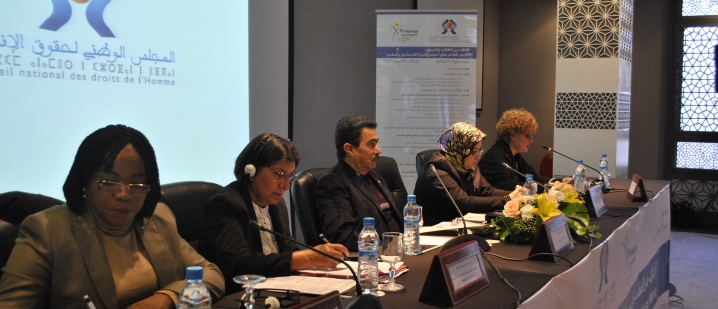International seminar in Rabat calls for equality and elimination of violence against women in Morocco

The National Human Rights Council and the Coalition of the Spring of Dignity, a civil society coalition that brings together 23 human rights associations, held an international seminar on violence against women on the 30th of January 2013 in Rabat.
The seminar shed light on the phenomenon that hinders development and jeopardizes the lives of one half of the Moroccan population. It was held in contribution to the national debate on a Bill prepared by the Moroccan Ministry of Solidarity, Women, Family and Social Development to combat violence against women.
A number of human rights activists, parliamentarians, government representatives, experts and other national and international actors took part in this seminar. Ms Rachida Manjou, UN Special Rapporteur on violence against women, and Ms Marie-Laurence Sranon Sossou, Minister of Family, Social Affairs, National Solidarity, Persons with Disabilities and Older People of Benin, honored this international gathering with their participation.
Mr. Mohamed Essabbar, CNDH Secretary General, indicated in the opening session that this seminar will be the basis of a memorandum that the Council will prepare on the subject, following a participatory and human rights based approach. This will be made in contribution to the efforts made by the different stakeholders to review legislations that may encourage discrimination and gender-based violence in Morocco. Such efforts reflect the commitment of Morocco to protect and promote human rights and the international humanitarian law. They should adopt the principle of equality expressly provided for in Article 19 of the Moroccan Supreme Law.
The participants of the Seminar highlighted the fact that legislations remain discriminatory, inconsistent with the letter and spirit of the Constitution and do not reflect Morocco's international commitments to fight discrimination and sex-based violence. They called on all stakeholders concerned to coordinate and make more efforts to fight violence against women, which is and should always be considered as a human rights violation.
Awareness and education on human rights, in general, and women’s rights in particular are the best tools to win this fight. Amending legislation that discriminates against one half of the population is another. The participants called for more laws and measures to eliminate gender based violence; the most prevalent human rights violation in the world.
Adopting a comprehensive and participatory approach to fight violence in the Moroccan society in general, and against women in particular was one of the recommendations of the seminar. The participants also recommended a protection and promotion approach that will put an end to impunity and the participation of civil society associations, using their memoranda and consulting with them in making laws combating violence against women. They called for clear public policies to fight gender based violence and a budget dedicated by the government to the promotion of women’s rights and the fight against gender based discrimination and violence.
The seminar was an opportunity to exchange on “the current situation of gender-based violence in practice and in legislation”; “international experiences in combating gender-based violence: prevention and protection”; and “the fight against gender-based violence in Morocco: current projects and visions”. A roundtable for parliamentarians (women) from different political trends was held on the sideline of this international gathering.
The Statement of the Special Rapporteur on violence against women, its causes and consequences highlighted women’s rights developments in the international sphere and the regional human rights systems. Ms Manjou shed light on the challenges and gaps in the legal framework and due diligence to prevent, protect, investigate, prosecute and punish acts of violence against women.
She commended the concrete steps taken by Morocco “to effectively respond to and prevent violence against women, as recommended by a number of international human rights mechanisms.” Morocco’s efforts to give effect to these recommendations are commendable, she said. She noted “that article 475 of the Penal Code was recently amended, to ensure that rapists who marry their underage victims do not escape punishment.”
She hoped the “elaboration and adoption of a specific gender-based violence law in Morocco leads to concrete and positive results in the promotion and protection of the rights of women and girls in this country, as well as the elimination of all forms of violence against them.”

